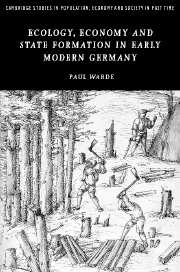Book contents
- Frontmatter
- Contents
- List of figures
- List of maps
- List of tables
- Acknowledgements
- Glossary
- List of abbreviations
- Introduction
- 1 The peasant dynamic
- 2 Power and property
- 3 The regulative drive
- 4 From clearance to crisis?
- 5 The two ecologies
- Conclusions
- Bibliography
- Index
- Cambridge Studies in Population, Economy and Society in Past Time
3 - The regulative drive
Published online by Cambridge University Press: 24 July 2009
- Frontmatter
- Contents
- List of figures
- List of maps
- List of tables
- Acknowledgements
- Glossary
- List of abbreviations
- Introduction
- 1 The peasant dynamic
- 2 Power and property
- 3 The regulative drive
- 4 From clearance to crisis?
- 5 The two ecologies
- Conclusions
- Bibliography
- Index
- Cambridge Studies in Population, Economy and Society in Past Time
Summary
The sixteenth and seventeenth centuries have long been seen as a key era in the development of the modern state in central Europe. After 1500, the consolidation of patrimonies and the promulgation of territorial laws, especially under the influence of Roman law, provided the legal grounds for ‘state’ action. A developing bureaucracy and the information technology of improving literacy skills and printing expanded the ability of officials to oversee the populace and divorced the exercise of authority from direct personalised relations of lordship. The increasingly expensive wars of the seventeenth century provided the greatest impetus towards the creation of a ‘tax state’ that moved beyond princely rulers' earlier reliance on more limited personal finance. Taken together these breakthroughs provided the underpinnings of the self-consciously interventionist and modernising state of the eighteenth century, whether in its ‘absolutist’ or ‘enlightened’ guises. These processes have been encapsulated in the term ‘state building’, describing the conscious centralisation of power. However, equally important for this process was the gradual accumulation of local loyalty across the entire period, integration of village powerbrokers into the machinery of government, and the ‘social disciplining’ of personnel to conform to centrally determined norms. These processes were far less directed and were subject to the approval of relatively lowly subjects. They were, however, essential for a state that bound the ambitions of ‘the centre’ and those of the ‘locality’ (or at least those who wielded influence locally) into a coherent unit that expected both to act to resolve problems, and was expected by its subjects to provide solutions to problems.
- Type
- Chapter
- Information
- Ecology, Economy and State Formation in Early Modern Germany , pp. 161 - 223Publisher: Cambridge University PressPrint publication year: 2006

